|
Aaron Ward |

|
AARON WARD was born November 26, 1834 to Mason and Hannah Barton Ward in what was then Newton Township, Gloucester County NJ. This location is presently within the borders of the City of Camden. He was the youngest of eight children, and interestingly enough, the second child born to Mason and Hannah Ward named Aaron. A brother named Aaron had been born in 1829 but died before his third birthday. Aaron Ward was educated at Westtown Academy, Westtown PA. He married Anna Bates on November 8, 1854. A daughter, Lettie Allen Ward, was born March 3, 1859. Son Franklin, was born August 12, 1860. Another daughter, Hannah arrived shortly |
|
thereafter. At the time of the 1860 Census the Ward family was living in Camden's North Ward. Aaron Ward was then earning a living as a house carpenter, as was his brother E. Allen Ward. In 1861 he was elected to Camden's City Council. During the War Between the States, Aaron Ward answered his country's call. He enlisted on September 3, 1862. On the 16th of September, at Camp Cadwalader in Beverly NJ, he mustered in as Captain of Company D, Twenty-fourth Regiment, New Jersey Volunteers, one of eleven regiments raised in response to President Lincoln's call for 300,000 troops to serve for a nine-month's enlistment. Company D had men from Camden, Gloucester City, and Glassboro. Serving under Lieutenant Colonel Frank L. Knight, Captain Ward's company arrived in Washington DC on October 1st, 1862. The Twenty-fourth Regiment was placed in the Provisional Brigade of General Carey's division. On December 9th they reached the Rappahannock opposite Fredericksburg, and was transferred to the First Brigade, under Brigadier General Nathan Kimball, part of Major General William H. French's Third Division, Second Army Corps. During the December 13th, 1862 assault on Fredericksburg, the raw troops of the Twenty-fourth Regiment advanced nearer the Confederate defenses than any other command save the Irish Regiments, and paid for that ground grievously, losing 160 killed and wounded. George Reeser Prowell wrote of the Twenty-fourth New Jersey's actions at Fredericksburg in the 1880, "They held the ground tenaciously until relieved, but even then were compelled to seek refuge in and about the burning buildings where, prostrate on the earth, they were exposed to the shot and shell." Company D lost three killed and twelve wounded during this battle. Captain Aaron Ward was shot through the lungs, a wound that for most in the Civil War would have proved fatal. He was fortunate and made a full recovery. The Twenty-Fourth New Jersey Regiment went into camp for four months after Fredericksburg. On April 2, 1863 copies of the "Peace Resolutions" which had been passed by the New Jersey state legislature, reached camp. Mass meetings were held where the soldiers in Prowell's words, "indignantly denounced" them. On May 3rd, 1863 the Twenty-Fourth New Jersey Regiment took part in the Battle of Chancellorsville. During that action forty men were either killed, wounded or listed as missing. Captain Aaron Ward may have been there, but most likely was not. He was discharged from service on May 31, 1863, and returned to his wife and family in Camden. On his return to home and hearth in Camden Aaron Ward returned to his seat on City Council. In 1864 it is known that he was, as a member of City Council, serving on the Committee on Accounts. The Aaron Ward family were then living at 323 Plum Street. Plum Street was later renamed Arch Street. He was involved in real estate and insurance by the time of the 1870 Census. Around 1874 he established a business as a "street and road" contractor. The Ward family then lived at 821 South 8th Street between Pine and Division Streets. Aaron Ward also operated his business out of this location. Aaron Ward enjoyed great success as a contractor, and was awarded several government projects. He built the first bridge across the Cooper River at Baird Avenue in 1903, and he also built another at Kaighn Avenue to cross the river, then known as Cooper's Creek. He built a concrete wharf at the foot of Cooper Street that was utilized for many decades, and in South Camden Aaron Ward's firm built the Line Ditch sewer. His obituary read "…that his greatest achievement was the Line Ditch sewer in which he saved the city thousands of dollars after numerous other contractors cited the difficulties of such a sewer at this place because of quicksands. Mr. Ward mastered these difficulties and the sewer is a memorial to his worth as a contractor." Annie Ward passed away after 1880. Aaron Ward would remarry twice afterwards, and lived to his eightieth year. He passed away on June 26, 1915, survived by his then wife Sarah W. H. Ward, son Franklin, daughters Dr. Lettie Ward, Mrs. Hannah Bardo, and Elizabeth Ward, a child of his third marriage. Aaron Ward was buried at Harleigh Cemetery in Camden. Well known and respected in the city, his pallbearers were David Baird, levi farnham, Sidney P. McCord, Isaiah Hatch, Frank S. Heisler, and William C. Riggs. On his father's passing, Franklin Ward continued in the construction business. Oldest daughter Lettie Allen Ward after teaching until her 30s, became a physician in 1897, gaining distinction as being one of Camden's first female doctors. She lived and practiced general medicine at 704 Broadway, and also was known as a specialist in ailments of the ear, nose, and throat. Elizabeth Ward would also become a physician. Aaron Ward's older brother E. Allen Ward was also a contractor, and is noted as the man who build the Camden City Hall which stood on Haddon Avenue, and served as Camden's seat of government form 1876 through 1930. Aaron Ward was a member of the Thomas M. K. Lee Post No. 5, Grand Army of the Republic; a member of Camden Lodge No. 15, Free and Accepted Masons. The Ward family were also members of the Broadway Methodist Episcopal Church. |
|
|
REGIMENTAL
HISTORY |
|
REGIMENTAL
HISTORY
Twenty-fourth
Infantry
This
regiment was mustered into the U. S. service at Camp Cadwalader,
Beverly, Sept. 16, 1862. Four companies of the regiment, B, F, G and
H, were from the county of Cumberland; On September 28, the regiment was equipped with Belgian rifles and other necessary accouterments for service, and on Tuesday, the 30th, broke camp and departed for Washington, going by steamer to Philadelphia and thence by rail. It was brigaded with the 28th New Jersey and 128th Pennsylvania regiments, under the colonel of the former, acting Brigadier General Abercrombie having command of the division, which occupied the extreme right of the brigade on the Leesburg road. It was afterward permanently brigaded with the 4th and 8th Ohio, 14th Indiana, 7th Virginia, and 28th New Jersey regiments under the charge of Brigadier General Kimball, in French's division, Couch's corps. It participated in the fighting at Fredericksburg, and the loss of the regiment, which behaved admirably throughout, was severe, amounting in all to 160. Sergeant Henry S. Spaulding, Company B, afterward promoted to the Second Lieutenantcy of Company I, received a musket ball in his shoulder; Captain Aaron Ward, Company D, a ball through his left lung; Second Lieutenant George D. Brittain, Company D, and Captain Samuel Harris, Company F, were shocked by explosions of shells; Second Lieutenant William Pepper, Company F, was wounded in leg and head; Sergeant H. R. Pierson, Company G, afterward promoted to Second Lieutenant, Company F, was wounded in the side; Sergeant John Springer, Company B, afterward Second Lieutenant of Company B, was wounded in the hip; 2nd Lieutenant James J. Reeves, Company H, was wounded in the left arm above the elbow; and Captain William C. Shinn, Company I, was wounded in the right eye, the sight of which was lost.
The
regiment also participated in the battle of Chancellorsville, where
the loss in killed and wounded in the regiment was comparatively
small, not exceeding 40 all told. The withdrawal |
| Philadelphia Inquirer - November 13, 1884 |

|
| J.K.
Blyber
- North
4th Street
- Market
Street Cooper Street - Liberty Street |
| Philadelphia Inquirer - July 28, 1890 |

|
| North 6th Street |
| Philadelphia Inquirer - July 19, 1899 |

|
|
emerald
street -
Federal
Street
- Front
Street Haddon Avenue - Kaighn Avenue - Mt. Ephraim Avenue |
|
Philadelphia Inquirer - November 24, 1898 |
|
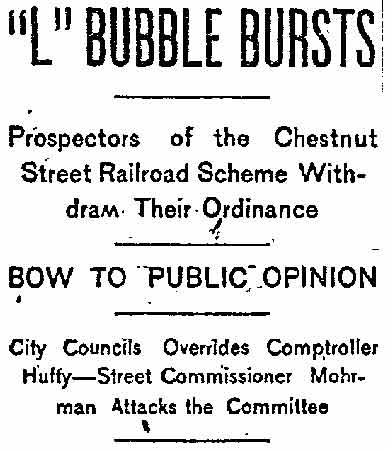
|
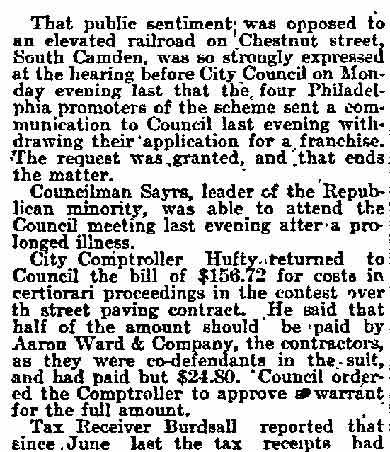
|
| …continued… | |
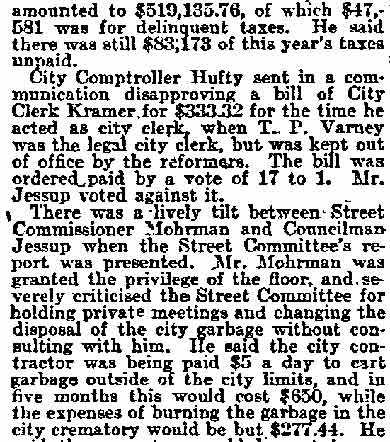
|
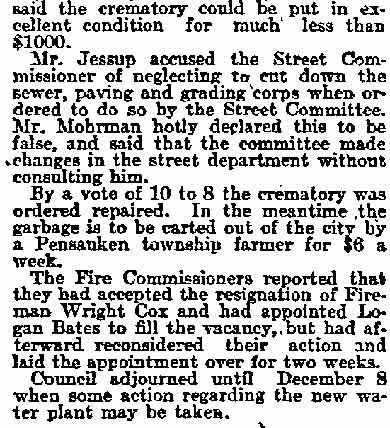
|
|
Samuel
Hufty
- Harry
C. Kramer
- George
W. Jessup
- Aaron
Ward |
|
| Philadelphia Inquirer - June 21, 1903 |
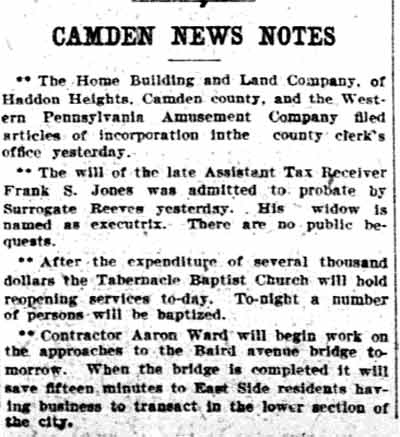
|
| Frank
S. Jones
- Aaron
Ward East Camden - Tabernacle Baptist Church Baird Avenue |
| Philadelphia Inquirer - June 28, 1915 |

|
|
Dr.
Lettie Allen Ward
- Frank Ward - Elizabeth Ward Mrs. Hannah Ward Barto - Aaron Ward South 8th Street |
| Camden
Courier or
Camden Post-Telegram June 28, 1915 |
|


|


|
|
Camden
Courier or
Camden Post-Telegram |
|

|

|
Thanks to Aaron Ward's great-grand-daughter for her help in building this page.
|
|
Regimental
History
NEW JERSEY TWENTY-FOURTH
INFANTRY
(Nine Months)
Twenty-fourth
Infantry
Colonel William B. Robertson
Lieutenant Colonel Franklin L. Knight
Major Joel A. Fithian
This regiment was mustered into the U. S. service at Camp Cadwalader, Beverly, Sept. 16, 1862. Four companies of the regiment, B, F, G and H, were from the county of Cumberland; three, A, C and K, from Salem; one, E, and parts of D and I, from Gloucester; and the remaining men of the two latter companies were from Camden. Of the members of Company B, about an equal number were enlisted from the city and townships of Millville and Maurice River. Of Company F the city of Bridgeton furnished about 30, the township of Greenwich 15, while the remainder, with the exception of 1 man from Deerfield, were equally divided between Hopewell and Doune. Of Company G, not less than 20 were from Bridgeton, 30 from Deerfield, 10 from Stoe Creek, and the rest hailed from Doune. Company H, officered exclusively by Bridgeton men, comprised about 75 from the city of Bridgeton, while the remainder were from Hopewell, Deerfield and Stoe Creek. In Cos. A and C, there were a large number of men from the city of Salem, though the surrounding townships were nearly all represented in them, and also in Company K. Company E comprised men principally from Woodbury, Paulsboro', and the upper townships of Gloucester. Company D had men from Camden, Gloucester City, and Glassboro, and Company I, mainly from Clayton township, Gloucester county, and several of the townships of Camden county.
On Sept. 28, the regiment was equipped with Belgian rifles and other necessary accouterments for service, and on Tuesday, the 30th, broke camp and departed for Washington, going by steamer to Philadelphia and thence by rail. It was brigaded with the 28th N. J. and 128th Pennsylvania regiments, under the colonel of the former, acting Brigadier General Abercrombie having command of the division, which occupied the extreme right of the brigade on the Leesburg road. It was afterward permanently brigaded with the 4th and 8th Ohio, 14th Indiana, 7th Virginia, and 28th N. J. regiments under the charge of Brigadier-General Kimball, in French's division, Couch's corps. It participated in the fighting at Fredericksburg, and the loss of the regiment, which behaved admirably throughout, was severe, amounting in all to 160. Sergeant Henry S. Spaulding, Company B, afterward promoted to the 2nd lieutenantcy of Company I, received a musket ball in his shoulder; Captain Aaron Ward, Company D, a ball through his left lung; Second Lieutenant George D. Brittain, Company D, and Captain Samuel Harris, Company F, were shocked by explosions of shells; Second Lieutenant William Pepper, Company F, was wounded in leg and head; Sergeant H. R. Pierson, Company G, afterward promoted to Second Lieutenant, Company F, was wounded in the side; Sergeant John Springer, Company B, afterward Second Lieutenant of Company B, was wounded in the hip; Second Lieutenant James J. Reeves, Company H, was wounded in the left arm above the elbow; and Captain William C. Shinn, Company I, was wounded in the right eye, the sight of which was lost.
The regiment also participated in the battle of Chancellorsville, where the loss in killed and wounded in the regiment was comparatively small, not exceeding 40 all told. The withdrawal of the army having been determined upon, the 24th, with the rest of the brigade, made its way back to the United States ford, where it crossed on the 6th and proceeded to its old camp, where it continued to do picket-duty until ordered to Washington. Proceeding thence in due time to Beverly, the regiment was mustered out and the men as they were paid off returned to their homes. The total strength of the regiment was 994, and it lost during service, by resignation 5, by discharge 108, by promotion 8, by transfer 1, by death 92, by desertion 8, not accounted for 1, mustered out, 771.
Source: The Union Army, Volume 3
|
|
|
Report
of Brig. Gen. Nathan Kimball,
U. S. Army, Commanding First Brigade. WASHINGTON, D. C., December 22, 1862.
Lieut.
J. W. PLUME,
SIR: I have the honor to report that, in obedience to your orders, I
moved my command, on the morning of the 11th instant, at daybreak,
from the camp of the division to the front, opposite Fredericksburg,
and halted at 8 o'clock in a ravine near the railroad, to the right of
General Sumner's headquarters.
I
have the honor to be, very respectfully, your obedient servant, |